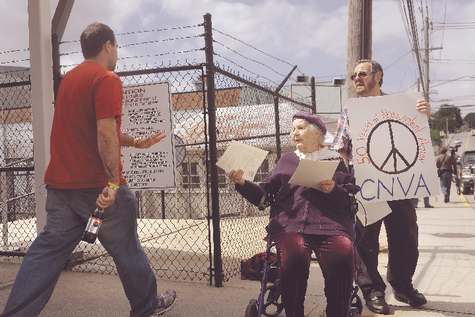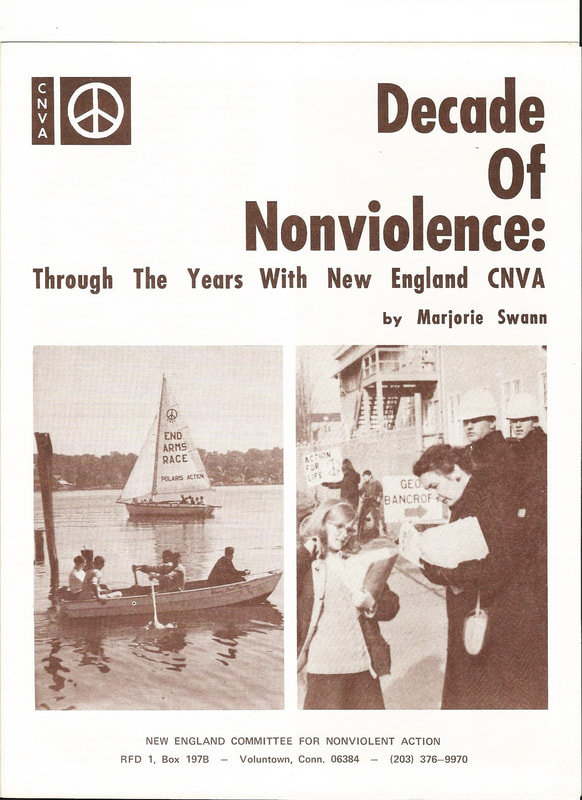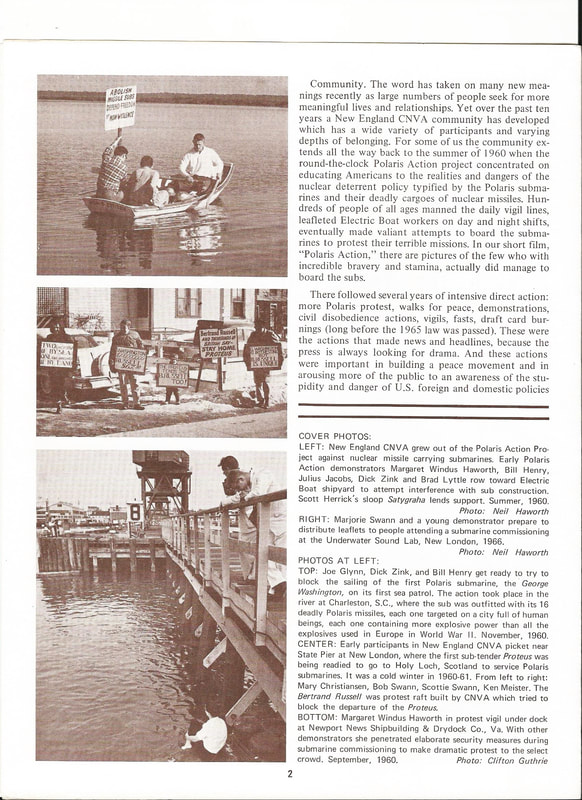|
For this week’s Peace of History:
Since the Polaris Action in the summer of 1960, peace activists had been leafleting sailors stationed at the Sub Base in Groton as well as to the workers at General Dynamic/Electric Boat, where the workers build the nuclear-armed submarines. Often in the early years, the activists would suffer violence or threats of violence, but they also won some significant success as well. From Polaris Action Bulletin No. 2, in just the first few weeks of the program: “Joseph Glynn tended his resignation from the Naval Reserve and returned his draft card to this board at a New London press conference the morning of June 6. He called upon all military men, ‘especially Navy men at the New London Submarine Base who are assigned to the Polaris Fish of Death, to resign from the Navy with him and join both Polaris Action and the movement for national defense thru nonviolent resistance.’ Joseph, a four year Navy enlisted man and three year Reservist, has written an open letter to his commanding officer, Rear Admiral Espe, 1st Naval District, Boston, and a statement Conscience Against Polaris Submarines. Copies of both documents are available from our office.” Stories like Joseph Glynn’s were not common, and indeed, most of the activists who attempted to appeal directly to the consciences of workers and sailors were usually met with ugliness. Later, on the drenching rainy afternoon of June 18, “Brad [Lyttle] sustained a blow on the jaw, and other minor physical assaults were absorbed nonviolently by several participants. A station wagon with a large sign mounted on top, driven by Jim Peck, was mobbed, nearly overturned and the sign torn down and mutilated[...] As the evening progressed, we became more and more involved with a number of shipyard workers and sailors who were rather antipathetic.” And yet, despite the rain, the violence, and the verbal abuse, the efforts of these activists were not for nothing -- the entry for that date ends with the line: “Among the multitude of opponents there were two sympathizers who have since rendered invaluable assistance to Polaris Action.” Later in the 1960s, as the war in Vietnam grew, some sailors sought military counseling from Marj Swann at CNVA. During the Trident/Conversion Campaign in the late 1970s, two workers publicly stated their opposition to the Trident Submarine Program; Dick Proescher, who wrote and spoke about his opposition, was fired for taking a few extra minutes on a break. In the 1990s, after the end of the Cold War and the massive layouts resulting from decreases in submarine manufacturing, the New England War Resisters League (successor to the CNVA) helped create the Community Coalition for Economic Conversion which included individual EB workers. Promoting a grassroots approach to economic conversion, the coalition worked on a Manufacturing Needs Assessment Survey and An Action Plan for Jobs with the EB Unions. This work resulted in changes in the retraining of EB workers, but have not yet won any real economic conversion projects. In 2010, for the fiftieth anniversary of Polaris Action, “Veterans of the New England Committee for Nonviolent Action and all its successor groups” wrote again to the workers of Electric Boat: “We are NOT here to put you out of your jobs. We know you have valuable skills and experience. We want to suggest, however, that those skills and that experience can be used to do work which will benefit our country , and indeed, the people of all nations. You know that this country’s infrastructure is falling apart. Our dams, bridges, roads, school-houses, and many other important structures need rebuilding. Also we need rapidly to change the patterns which are destroying our environment. That means stopping the use of coal, gas, oil and nuclear fuels, and quickly developing new fuels using solar, wind, and water elements. You have -- or can easily learn -- the skills to do all this work.” We have written about the potential dangers of nuclear weapons in the past, but have focused less on the ongoing consequences of our government’s nuclear arms program. According to Timmon Wallis of NucleaBan.US (and one of the speakers in our recent Nonviolent Social Change in the Time of Covid-19 series), the projected cost of the United States nuclear weapons infrastructure -- including upkeep, potential clean-ups, and new systems -- comes out to about $90.7 billion annually. As Wallis notes in his free book Warheads to Windmills, “Unlike the money spent on renewable energy, this is not a capital investment in things that will bring a return of income at a later date. This money is simply spent and then it is gone. It is turned into weapons that can never even be used except in an end-of-the-world scenario.” Moreover, every person using their valuable skills, labor, and creativity on nuclear weapons is not using them for something like green energy. Many skills required to work on various levels of the nuclear arms program are transferable to more productive and necessary fields: research, engineering, design, fabrication, and more. Sources: “A Message to Those Who Work At Electric Boat.” CNVA (June 11, 2010) Polaris Action Bulletin No. 2. CNVA (June 14, 1960) Polaris Action Bulletin No. 3. CNVA (June 22, 1960) “Warheads to Windmills.” http://www.nuclearban.us/w2w/ Coda: Today, “cancel/callout culture” is a popular form of online activism in which one publicly shames someone perceived to have said or done something problematic. Directed at a celebrity, this may include active harassment as well as passive boycotting of their products. Directed at a neighbor, however, this ultimately leads to blocking the offender on social media -- a silencing, a removal, and a deepening of divisions. For people of color, sometimes it is a matter of mental or physical safety to remove oneself from engaging with hateful people. But on the same token, and especially for White allies, directly engaging with and attempting to convert the opposition is oftentimes the most courageous and productive action to take. Comments are closed.
|
AuthorWrite something about yourself. No need to be fancy, just an overview. Archives
March 2023
Categories |



 RSS Feed
RSS Feed